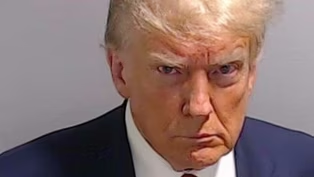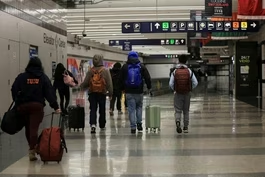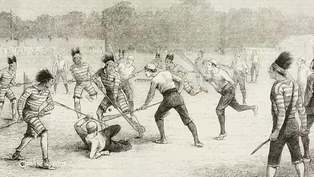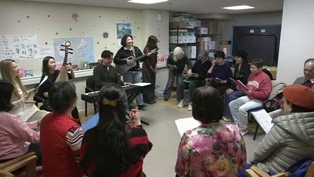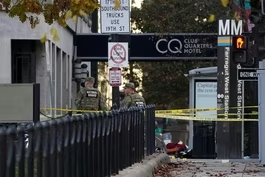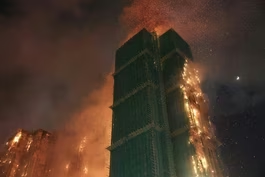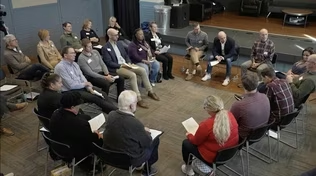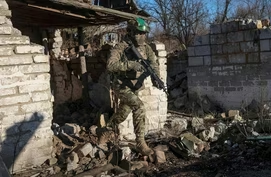
November 26, 2025 - PBS News Hour full episode
11/26/2025 | 57m 46sVideo has Closed Captions
November 26, 2025 - PBS News Hour full episode
Wednesday on the News Hour, two National Guard members are shot in Washington, sparking a White House lockdown and the president's ire. The push for peace in Ukraine is complicated by a leaked call from the chief White House negotiator. Plus, dozens of women accuse an Army OB-GYN of recording his patients.
Problems playing video? | Closed Captioning Feedback
Problems playing video? | Closed Captioning Feedback
Major corporate funding for the PBS News Hour is provided by BDO, BNSF, Consumer Cellular, American Cruise Lines, and Raymond James. Funding for the PBS NewsHour Weekend is provided by...

November 26, 2025 - PBS News Hour full episode
11/26/2025 | 57m 46sVideo has Closed Captions
Wednesday on the News Hour, two National Guard members are shot in Washington, sparking a White House lockdown and the president's ire. The push for peace in Ukraine is complicated by a leaked call from the chief White House negotiator. Plus, dozens of women accuse an Army OB-GYN of recording his patients.
Problems playing video? | Closed Captioning Feedback
How to Watch PBS News Hour
PBS News Hour is available to stream on pbs.org and the free PBS App, available on iPhone, Apple TV, Android TV, Android smartphones, Amazon Fire TV, Amazon Fire Tablet, Roku, Samsung Smart TV, and Vizio.
Providing Support for PBS.org
Learn Moreabout PBS online sponsorshipNICK SCHIFRIN: Good evening.
I'm Nick Schifrin.
Geoff Bennett and Amna Nawaz are away.
On the "News Hour" tonight: Two National Guard members are shot in Washington, D.C., sparking a White House lockdown and the president's ire.
The last case against President Trump for trying to overturn the 2020 election is dropped.
The push for peace in Ukraine is complicated by a leaked call from the chief White House negotiator.
And dozens of women accuse an Army OB-GYN of recording his patients -- the latest on their lawsuit and the massive investigation that's followed.
ANDREW COBOS, Attorney For Alleged Victims: The unfortunate thing is that this is a pattern that happens in the Army and, quite frankly, happens in all of the military services.
(BREAK) NICK SCHIFRIN: Welcome to the "News Hour."
Two National Guardsmen are in critical condition after a shooting near the White House this afternoon.
The lone suspect is in police custody.
In Washington, D.C., Muriel Bowser spoke about the shooting moments ago.
MURIEL BOWSER (D), Mayor of Washington, D.C.
: This is a targeted shooting.
One individual who appeared to target these Guardsmen, that individual has been taken into custody.
NICK SCHIFRIN: And FBI Director Kash Patel said the FBI is assisting in the investigation.
KASH PATEL, FBI Director: We have assembled the full force of both the federal and state and local law enforcement agencies to bring to bear all of our resources to make sure we find the perpetrators responsible for this heinous act.
And make no mistake.
They will be brought to justice.
NICK SCHIFRIN: The Guard's presence in the nation's capital has sparked political debate and lawsuits over how the Trump administration has used military resources as part of its efforts to crack down on crime.
Our White House correspondent, Liz Landers, is following the latest developments and joins me now.
Liz, so what do we know?
LIZ LANDERS: Yes, so the Metropolitan Police chief said that this suspect at around 2:15 this afternoon approached two Guardsmen right outside of the White House, close to an area that is heavily trafficked by pedestrians, raised a weapon and fired directly at these two Guardsmen.
He called it an ambush attack.
And he said that the suspect was quickly apprehended, though, because there are so many other law enforcement officers in the area.
So other National Guards members came to assist.
I talked to a Secret Service source who said that Secret Service were there within minutes because they are within that purview area as well.
So the suspect was quickly apprehended.
That person is now in a hospital being treated.
The two Guards members who were shot are being treated are in critical condition, as we heard from the FBI director there.
And this is all in an area that is -- tons of people are walking around this part of Washington, D.C.
This is right near a Metro stop as well.
The president is not in Washington, D.C., right now.
However, the White House did go into a lockdown briefly, we understand.
And the president tweeted about this today or posted on TRUTH Social, on his social media account, that: "The animal that shot the two National Guardsmen, with both being critically wounded and now in two separate hospitals, is also severely wounded, but regardless will pay a very steep price."
You heard that from the FBI director, Kash Patel, saying that they're going to bring the fullest extent of the law against this suspect here.
And also in response to this, we have heard just in the last few minutes that the secretary of defense, Pete Hegseth, says that the president has also asked for 500 additional troops to be deployed to Washington, D.C., after the shooting today.
NICK SCHIFRIN: Liz, I'm going to switch gears for us in what is really the end of a chapter in American history.
The final criminal charges against President Donald Trump have been dropped after a prosecutor in Georgia moved to dismiss the case focused on a push to overturn the 2020 election results in the state.
The president, as we remember, was one of 19 suspects -- that's his mug shot back then -- including his former chief of staff, Mark Meadows, as well as former attorney Rudy Giuliani.
What happened today?
LIZ LANDERS: I want to remind our viewers that this was all precipitated by a phone call, an infamous phone call now, between President Trump and Georgia Secretary of State Brad Raffensperger.
DONALD TRUMP, President of the United States: So what are we going to do here, folks?
I only need 11,000 votes.
Fellows, I need 11,000 votes.
Give me a break.
We have that in spades already.
LIZ LANDERS: Nick, that phone call happened at the beginning of January in 2021.
By February, just a month later, the district attorney in Fulton County, Georgia, Fani Willis, had opened a criminal investigation into that phone call and whether the president was pressuring the secretary of state to overturn the election results in Georgia.
This resulted in a long legal battle.
And there were criminal charges that were brought against the president and these 18 other co-defendants in August of 2023.
Now, this was considered a RICO, or a racketeering, case.
It was sweeping.
There were different charges against different defendants here.
But this was all a number of people that are high-profile and that I think our viewers would remember.
Mark Meadows, the former White House chief of staff, Rudy Giuliani, the president's personal attorney, were caught up in this as well.
These charges were all dismissed today by the special prosecutor down there who has just recently been appointed to oversee this.
He asked for these charges to be formally dismissed by the judge, basically saying that he does not think that there is enough information to bring these charges, going -- enough to bring these charges going forward here because it is too sweeping of an indictment, and it would take too long because the president is a sitting president right now.
He does not believe he can charge a sitting president.
NICK SCHIFRIN: So tell us more about this prosecutor and, as you were saying, why does he feel like this case needed to be dropped right now?
LIZ LANDERS: Peter Skandalakis is the prosecutor that took over for Fani Willis there when she was taken off of this case.
There was some legal drama around that.
He took over this case just recently and he released this 23-page filing today.
And I spoke earlier today with Gene Rossi, who's a former federal prosecutor, and he offered his interpretation of why this was dismissed.
GENE ROSSI, Former Federal Prosecutor: And the word T-O-O comes to mind here.
This indictment had too many defendants, including President Trump, it had too many counts and it was going to take too long to try this case if they did it in one trial.
And when I'm reading this decision by this special prosecutor, I get the impression he looked at this indictment and he said, what a hot mess.
It's just a lot of things put together, a hodgepodge of charges, allegations.
And, frankly, he didn't like it and he didn't like it that it was against the sitting president.
LIZ LANDERS: And, Nick, Peter Skandalakis also wrote today in this decision, this legal filing, he said that: "Given the complexity of the legal issues at hand, bringing this case before a jury in 2029, 2030 or even 2031 would be nothing short of a remarkable feat."
NICK SCHIFRIN: Is this the end?
LIZ LANDERS: It sounds like it is, according to Skandalakis.
I mean, he has asked the judge in this case to fully dismiss all of the charges against the president and these other 18 co-defendants here.
Rossi also sort of summed this up I think nicely too.
GENE ROSSI: I think a snowball in a certain part of the world has a better chance of survival than this case.
This case is dead.
And I can't see how it could possibly be resurrected in Georgia or in any other state.
LIZ LANDERS: And this is overall a win for the president and for his allies here.
And the president posting about this on TRUTH Social today, saying that justice had prevailed here, Nick.
NICK SCHIFRIN: Absolutely.
Liz Landers, our White House correspondent, covering two stories for us, thanks very much.
And in the day's other news: On this day before Thanksgiving, a major winter storm and a plunge in temperatures is wreaking havoc with many travelers' schedules.
Flight delays are piling up.
And, as John Yang reports, temperatures will drop to 20 degrees below normal in much of the Central and Eastern parts of the country.
JOHN YANG: In the Upper Midwest, a heaping Thanksgiving serving of snow.
Overnight, blizzards blanketed the Great Lakes with more than a foot-and-a-half of snow in some areas, making highways dangerously slick, like this one lined with tractor trailers in Western Minnesota.
It's part of a storm system hitting the Midwest and the Northeast with wet, windy weather as millions of Americans buckle up for holiday travel.
AAA says about 90 percent of Thanksgiving travelers across the country will drive.
Traffic jams are all but certain.
MAN: Traffic became a parking lot.
It tacked on another four hours.
JOHN YANG: Others will fly in what's been a turbulent period for air travel caused in part by the government shutdown.
The FAA is anticipating the busiest day in 15 years, with more than 360,000 flights scheduled throughout the week.
According to FlightAware, by late today, about 4,000 domestic and international flights were delayed at U.S.
airports.
That's almost one in ten.
SEAN DUFFY, U.S.
Transportation Secretary: Let's all be better when we travel together.
JOHN YANG: The secret to a smooth travel day?
Transportation Secretary Sean Duffy says it's a respectable outfit.
He was interviewed by The Blaze about his new civility campaign.
SEAN DUFFY: I get being comfortable.
We like being -- we're in an era where people don't wear suits as much anymore.
They don't wear ties as much anymore.
At some point, we can't dress like we're going to bed.
JOHN YANG: For many travelers, flying smart is key.
And in the end, being with family is always worth the chaos.
WALKER POWELL, Traveler: Preparing for travel for Thanksgiving week really comes to long-term preparation of thinking about when we're going to fly, what time of day is it going to be, what day is it going to be.
With our family living in Louisiana and us in Colorado, we don't get in to that many times to see each other, especially with the kids seeing their grandparents.
You have got to take advantage of any opportunity you get.
JOHN YANG: For the "PBS News Hour," I'm John Yang.
NICK SCHIFRIN: Elsewhere today, Hong Kong's leader says eight years of life has been a massive fire in a high-rise apartment complex has killed at least 36 people, with another 279 still missing.
The blaze broke out Wednesday afternoon in a residential district after bamboo scaffolding caught fire.
The flames burned through the night.
Firefighters said wind made the fire difficult to contain.
As of midnight local, officials say it was -- quote -- "coming under control."
The complex is home to 4,800 residents, one of whom evacuated safely and then watched the fire spread.
JASON KONG, Apartment Complex Resident (through translator): I am devastated.
There are so many neighbors and friends.
I don't know what is going on anymore.
Look, all the apartments are just burning.
I don't know what to do.
I hope the government can help us to settle down after this.
NICK SCHIFRIN: The blaze is the deadliest for Hong Kong in nearly three decades.
Local media report that three people have been arrested on suspicion of manslaughter in connection with the fire.
Taiwan's president announced a special $40 billion military budget today following U.S.
pressure for the self-ruled democracy to increase defense spending.
The budget includes plans to build a Taiwan dome air defense system and buy American missiles, as well as launch joint U.S.-Taiwan arms production.
The funds will be allocated over a period of eight years starting from 2026.
Lai says it's aimed at addressing what he called China's threats to Taiwan and the Indo-Pacific region.
In Southern Thailand, severe flooding has killed at least 33 people since relentless monsoon rains began late last week.
The Thai military dispatched boats to conduct water rescues, as well as helicopters to airlift people stranded on rooftops.
Thailand's prime minister declared a state of emergency for the worst affected Songkhla region.
More than two million people have been displaced.
Rainfall began to ease today, giving authorities hope that water levels will start to recede.
In the Middle East, Israel today returned the bodies of 15 Palestinians to Gaza health authorities.
It is the latest exchange under the fragile cease-fire agreement that took effect last month.
The return followed Israel identifying remains returned yesterday of slain hostage Dror Or.
That leaves the remains of two hostages yet to be returned from Gaza, one Israeli and one Thai national.
In the West African nation of Guinea-Bissau, soldiers say they have taken -- quote -- "total control" of the country days after elections in which both presidential contenders claimed victory.
A military spokesperson said on state media they acted because of an ongoing plan aimed at manipulating the election results.
The electoral commission was due to announce its initial findings tomorrow.
Instead, the military has suspended the electoral process, closed the country's borders and instituted a curfew.
It is just the latest in a string of coups or attempted coups since Guinea-Bissau's independence from Portugal in 1974.
And on Wall Street today, stocks posted solid gains heading into the Thanksgiving holiday amid ongoing hopes for an interest rate cut.
The Dow Jones industrial average added more than 300 points.
Nasdaq rose nearly 200 points.
The S&P 500 closed higher for a fourth straight session.
And on this Thanksgiving eve in New York City, thousands have been watching the annual inflating of the balloons ahead of the 99th Macy's Thanksgiving Day Parade.
This preview of the main event has become a beloved tradition all its own.
Officials say it takes about 90 minutes to inflate each one, and some will stand as tall as five stories high.
Still to come on the "News Hour": what's affecting turkey prices this Thanksgiving; Judy Woodruff meets with a group pushing for bipartisan immigration reform; and we explore the lesser-known history of a uniquely American sport.
Today, U.S.
officials told "PBS News Hour" they are making progress toward a document designed to end the nearly four-year grinding war.
But today in Ukraine, the war raged on.
Today in Ukraine, civilians pay the price of war.
Terrified residents of Zaporizhzhia watch their homes burn.
They grab prized possessions and feel peace is impossibly far.
Asked about U.S.
diplomacy: YULIA KARAVATA, Zaporizhzhia Resident (through translator): I don't know what to think.
Looking at what's happened, this doesn't feel much like a peace plan.
QUESTION (through translator): Do you believe in peace?
YULIA KARAVATA (through translator): No.
If I let myself believe that, then peace will come at a very high cost, the cost of our lives.
NICK SCHIFRIN: The first draft of the U.S.
peace plan required Ukraine to reduce the size of its military by almost a third, abandon ambitions to join NATO and give up and demilitarize territory in Donetsk that Russia has failed to seize despite 11 years of war.
Recently, Russia's called the fall of Donetsk inevitable, a position endorsed last night by President Trump.
DONALD TRUMP, President of the United States: If you look, it's just moving in one direction.
So, eventually, that's land that, over the next couple of months, might be gotten by Russia anyway.
NICK SCHIFRIN: Today, Ukrainian President Volodymyr Zelenskyy called that assessment unacceptable.
VOLODYMYR ZELENSKYY, Ukrainian President (through translator): Russians are peddling the narrative around the world that Ukraine allegedly cannot defend itself.
The daily results of our special forces and our deep strikes, these are all proof that Ukraine can defend its interests.
It is not Ukraine that must be pressured for peace, but Russia.
NICK SCHIFRIN: U.S.
and European officials tell "PBS News Hour" recent negotiations have produced significant edits and agreements on most points.
But Ukraine wants the most difficult decision about giving up territory discussed directly by President Zelenskyy.
Next week, special envoy Steve Witkoff will go to Russia to meet Vladimir Putin, who today described progress.
VLADIMIR PUTIN, Russian President (through translator): I will be happy to inform you about the direction of achieving acceptable and sought-after results for us in Ukraine by peaceful means.
NICK SCHIFRIN: Russia's confidence in a U.S.
deal is now reflected by Witkoff's own words.
Yesterday, Bloomberg published an unprecedented leaked transcript of a phone conversation between Witkoff and Putin's top foreign policy aide Yuri Ushakov.
Witkoff told Ushakov: "I have the deepest respect for President Putin."
And Witkoff advised Ushakov on how Putin should speak to Trump: "Congratulate the president on this achievement of a cease-fire in Gaza."
In Ukraine, Witkoff said: "I know what it's going to take to get a peace deal done, Donetsk and maybe a land swap somewhere.
But I'm saying, instead of talking like that, let's talk more hopefully, because I think we're going to get a deal here."
In response, Nebraska Republican Don Bacon, who's retiring, said Witkoff should be fired.
And Pennsylvania Republican Brian Fitzpatrick said Secretary of State Marco Rubio, should be allowed to do his job.
But President Trump defended Witkoff.
DONALD TRUMP: I haven't heard it, but I heard it was standard negotiation.
QUESTION: So you're not worried that he's too pro-Russian?
DONALD TRUMP: No, I think, look, this war could go on for years.
And Russia's got a lot more people, a lot more soldiers.
NICK SCHIFRIN: As for Ushakov, he said today the transcript was published to divide Washington from Moscow.
YURI USHAKOV, Russian Presidential Aide (through translator): To interfere with us.
It's unlikely it was done to improve the relationship.
NICK SCHIFRIN: But most European officials want the Washington-Moscow relationship to become more adversarial.
KAJA KALLAS, Vice President, European Commission: In any peace agreement, we have to put the focus on how to get concessions from Russian side, that they stop aggression for good and do not try to change borders by force.
NICK SCHIFRIN: In addition to Witkoff's travel to Russia next week, Secretary of the Army Dan Driscoll will continue to speak to the Ukrainians after he returned to the U.S.
today.
This week, the U.S.
Army has been reckoning with a sexual abuse scandal that could involve the largest number of allegations in its history.
An Army doctor is accused of abusing women who were under his care.
Here's Amna Nawaz.
AMNA NAWAZ: The Army has sent out approximately 2,500 patient notification letters to women examined by one doctor within its ranks.
It's part of a massive investigation into cases of alleged sexual abuse, all patients of 47-year-old doctor and Army Major Blaine McGraw.
He's an OB-GYN at Fort Hood in Texas and before that at an Army base in Hawaii.
Approximately 80 women have filed a legal complaint against him.
One case alleges that McGraw -- quote -- "used his position of trust to sexually exploit, manipulate and secretly record women under his care."
Joining us now is attorney Andrew Cobos representing 70 alleged victims of Dr.
McGraw.
Cobos is a West Point graduate who served in the U.S.
Army, including at Fort Hood.
Andrew, welcome to the show.
Thanks for joining us.
ANDREW COBOS, Attorney For Alleged Victims: Glad to be here.
AMNA NAWAZ: So just start by telling us about these women that you're representing.
Who are they?
Are they active duty?
Are they military spouses?
And what exactly are they alleging was done to them by this doctor?
ANDREW COBOS: The majority of the women that we represent are military spouses, and they span all four branches of the military, Army, Air Force, Navy, and Marine.
Now, this abuse happened both at Fort Hood and in Hawaii at Tripler Army Medical Center.
And there were hundreds, if not thousands, of women under Dr.
McGraw's care, and he violated them in multiple ways.
He took photographs and videos of them as they were in their most vulnerable position in his exam room.
He touched them in improper ways that were medically unnecessary.
And, on occasion, he induced birth without their consent, without their knowledge, and without notification to their family that they were going to give birth.
And so this is, as I have been describing it, one of the most -- one of the largest and most significant sexual assault cases in the history of the military.
AMNA NAWAZ: In one of the complaints filed by Jane Doe -- obviously, her identity is protected -- she talked about invasive breast and vaginal exams that were unnecessary, not being given a medical gown to wear during those examinations and then, as you mentioned, secretly being recorded on a phone that Dr.
McGraw kept in his jacket pocket.
How did your clients come to learn about those photos and videos?
ANDREW COBOS: Fortunately, one of the women that we represent had her husband in the examination room.
Now, this is not a common occurrence.
It was actually a rare occurrence for Dr.
McGraw to have anybody, to allow anybody in the exam room while he was working on these patients.
And the husband of his patient was behind Dr.
McGraw.
He leaned in while he was doing a pelvic examination and his phone in his lab coat tipped forward.
The husband was able to visually see that the phone was on record.
And immediately he was concerned about his wife, about her in this position.
And so he tried notifying the chain of command.
He called CID.
Fortunately, CID started an investigation.
And he experienced a lot of frustration trying to bring his complaints and trying to bring awareness to the military that this doctor was unlawfully and improperly recording his patients.
And so, ultimately, CID got involved.
An investigation was undertaken.
And they found large numbers of videos and photographs on his phone.
AMNA NAWAZ: CID, of course, is the Criminal Investigative Division of the Army.
The Army did provide us with a statement, which I want to read to you in part here.
They said, they're committed to supporting patients affected by the allegations.
They have swiftly established a call center, assigned a special victims counsel, are actively notifying patients.
And they say they have created a patient support line as well.
They're encouraging people with information to come forward.
But, as you mentioned, Andrew, before Fort Hood, Dr.
McGraw was posted in Hawaii.
They tell us in a statement that they're in the process of notifying Dr.
McGraw's patients.
You told my colleague that you spoke to nurses at that Hawaii medical center.
What did you hear from them?
ANDREW COBOS: When I spoke to the nurses at Tripler Army Medical Center, what they said is that it was common knowledge around Tripler that there were allegations against Dr.
McGraw of videotaping and recording his patients, so much so that it was a stating joke among the folks at Tripler that Dr.
McGraw always got the crazy patients.
And that is what I have heard.
We are working to establish in greater detail the investigation that was conducted over McGraw at Tripler Medical Center.
We know that there was an investigation, but, so far, we hadn't heard from the Army.
And that's left a lot of people wondering, how long did the Army know, what did they know, and why didn't they take proactive measures to address these situations?
AMNA NAWAZ: So, you know that there was a complaint at the Hawaii medical center before he was transferred to Fort Hood.
I know some of your clients said they complained about this doctor and those complaints went nowhere.
ANDREW COBOS: Well, really, we have a couple different issues there.
One is that complaints were going unrecognized.
I have clients who, after visiting with McGraw, stepped outside into the hospital, and they talked to the on-duty nurse.
They talked to the sergeant who was at the desk in tears.
One of my clients tells me she was in tears and she talked for 10 minutes and she said, he violated me.
And she was given a telephone number and said: "I can't take a report.
Call this number."
And she called the number time after time after time after time and she got hung up on.
She got put on hold.
She was unable to actually make the report.
And this is one of the common complaints.
AMNA NAWAZ: I realize there are a lot of questions still unanswered here, Andrew, but what does justice look like?
What's the accountability your clients are seeking?
ANDREW COBOS: There are multiple ways that justice should occur and accountability should occur in this situation.
The first and most obvious way is to hold the perpetrator responsible for his actions.
But McGraw is also accountable to my clients, who he victimized.
But more than that, the Army is accountable and they should be held responsible for what they did not do in this situation.
My clients are ultimately filing a federal tort claims act lawsuit against the Army, and they're seeking restitution for the damages and the harms that they suffered at the hands of an Army employee, who should have been removed from that position.
And the unfortunate thing is that this is a pattern that happens in the Army and, quite frankly, happens in all of the military services.
And if you just want to go back to the Vanessa Guillen incident in 2020 and look at what the fallout was from that incident, a 272-page report addressing the shortcomings of the Army.
And it happens again and again and again.
And I think that that is what accountability looks like.
It looks like reforming the system, not just paying it lip service, but actually going in and figuring out, how do we address the problem of sexual assault in the military?
And that is a good starting point to address the problems that these victims faced and what accountability looks like in the Army.
AMNA NAWAZ: That is attorney Andrew Cobos joining us tonight.
Andrew, thank you for your time.
We hope you will come back as you learn more about this case as it unfolds.
We appreciate it.
ANDREW COBOS: Thank you.
I absolutely will.
NICK SCHIFRIN: It is the night before one of the most beloved American traditions, giving thanks, and most likely eating turkey.
How much will that bird and all the holiday trimmings cost this year?
"PBS News Hour" digital producer Tim McPhillips recently spoke to a food economist to break it down.
TIM MCPHILLIPS: Inflation tariffs, bird flu, will you be crying foul over the cost of your Thanksgiving feast?
Here are three things to know.
One, turkey wholesale prices are up a lot.
DAVID ORTEGA, Professor of Food Economics and Policy, Michigan State University: We're looking at wholesale prices today being about 40 percent higher than last year.
TIM MCPHILLIPS: David Ortega, a food economist at Michigan State University, says turkey producers are dealing with dueling outbreaks, the first being avian influenza, or bird flu.
DAVID ORTEGA: And, on top of that, you have another respiratory virus, AMPV, that has reduced the number of viable eggs and really slowed flock rebuilding.
TIM MCPHILLIPS: The bird flu outbreak that started in 2022 is part of what caused egg prices to skyrocket last winter.
And like with chickens, when one turkey tests positive for bird flu, the whole flock must be culled.
DAVID ORTEGA: And this year alone, more than two million turkeys have been lost.
TIM MCPHILLIPS: But know this.
While farmers have had to beef up on biosecurity on their farms, the turkeys in the store are safe to eat.
DAVID ORTEGA: Infected birds do not enter the food supply.
TIM MCPHILLIPS: Two, while wholesale turkey prices are up, turkey retail prices are actually relatively flat.
DAVID ORTEGA: Retailer often use whole turkeys as a loss leader.
TIM MCPHILLIPS: That means stores sell the birds below cost to win your business for the rest of your Thanksgiving meal.
So grocery stores are locked in a bit of a price war when it comes to whole turkeys, specifically frozen ones.
DAVID ORTEGA: Loss leader pricing is very common during the holidays, because it's one of the most effective ways to draw shoppers through the door.
TIM MCPHILLIPS: So despite turkey wholesale prices being up, frozen turkeys are still sometimes less than $1 per pound.
And many stores offer a Thanksgiving basket or meal deal, a turkey and all the fixings for a set cost.
DAVID ORTEGA: Walmart Thanksgiving basket is priced at the lowest ever since the program started.
TIM MCPHILLIPS: That meal deal has been the source of a political food fight.
DONALD TRUMP, President of the United States: I just saw that Walmart came out with a statement last night -- they have done it for many years -- that Thanksgiving this year will cost 25 percent less than Thanksgiving last year.
TIM MCPHILLIPS: But: DAVID ORTEGA: It's also worth pointing out that there are fewer items in that basket.
And so it's -- you're not comparing apples to apples here.
TIM MCPHILLIPS: Still, these kinds of bundles can be a good way to fill your table.
So shop around and check stores mobile apps for the best deals.
Three, the cost of the rest of your Thanksgiving meal is a mixed bag.
Grocery prices are up about 25 percent over the past five years and: DAVID ORTEGA: About 2.7 percent higher than they were a year ago.
TIM MCPHILLIPS: Certain foods are up even higher.
Going with beef on your table?
DAVID ORTEGA: Those prices are record highs right now at the retail side.
TIM MCPHILLIPS: Fresh vegetables are up 3 percent year over year and canned vegetables up 5 percent.
One shining reason for that?
DAVID ORTEGA: That has to do in part with some of the increases in production costs from the tariff, in particular, the tin steel from the steel and aluminum tariffs that have made that input much higher in price.
TIM MCPHILLIPS: How about that after-dinner coffee?
DAVID ORTEGA: That is up over 18 percent compared to last year, so near record highs for coffee.
TIM MCPHILLIPS: Pies and desserts haven't increased much, unless they contain chocolate.
Cocoa prices are near record highs.
DAVID ORTEGA: That's because of supply constraints from consecutive years of poor harvest in some of the cocoa-growing regions in the world and West Africa.
TIM MCPHILLIPS: And if all that makes you want: DAVID ORTEGA: Wine for your holiday table.
TIM MCPHILLIPS: Know that imported wine is also more expensive due to tariffs, but: DAVID ORTEGA: Domestic wine prices are slightly down compared from last year.
That has to do with some excess supply, but also some softening demand.
TIM MCPHILLIPS: For PBS News, in charge of key lime pie this Thanksgiving, I'm Tim McPhillips.
NICK SCHIFRIN: For years, immigration has been at the forefront of the national debate, but a legislative solution remains elusive.
Judy Woodruff recently met a group of citizens trying to push for bipartisan immigration reform, even in this polarized age.
It's part of her series America at a Crossroads.
MAN: We have to stop the bleeding, which means -- that means securing the border.
NOHA EYADA, Democratic Voter: I believe that this country is based on immigrants and it thrives on immigrants.
JUDY WOODRUFF: On a recent Saturday morning, locals gathered at a community center in South Lebanon, Ohio, a small working-class city of about 6,000 residents northeast of Cincinnati, to discuss an issue that has divided families, communities, Congress and the country, and left tens of millions of people in legal limbo for decades.
JULIE CASTILLO, Republican Voter: My husband came from Mexico to the United States to build a better life and provide for his mom, dad and sisters in Mexico in 2003.
All the unknowns put a toll on our family, like not knowing if he's coming home to us each night, fearing immigration, fearing that they're going to take him from his job site.
SCOTT PELL, Republican Voter: Some of these issues that have come up on immigration in particular have really hit home for me because I'm sort of that Rust Belt area, where workers and people were getting addicted to drugs and committing suicide and things like that.
And so I think that is tied to a larger issue of ignoring workers' welfare.
JUDY WOODRUFF: The meeting was organized by Braver Angels, a bridging group that brings together regular people from across the political divide to try to turn down the temperature on partisanship and polarization.
FRANK HOFFMAN, Republican Voter: I think we all, as humans, have a lot more in common than I think our media presents.
BILL CRAIG, Democratic Voter: I poured out my most deeply held values around this issue and the red-leaning guy I was with said, "There's not one thing you said that I disagree with."
JUDY WOODRUFF: This discussion took place in the same room where Braver Angels began nine years ago, following President Trump's first election and a bitter campaign.
DAVID LAPP, Co-Founder, Braver Angels: The level of stereotyping and the saying, I'm not going to associate with you because of how you voted, that that seemed to be rising.
JUDY WOODRUFF: South Lebanon resident David Lapp co-founded Braver Angels... DAVID LAPP: Linda, I'm going to start with you if that's OK.
JUDY WOODRUFF: ... and continues to moderate sessions like these.
He says growing up in an Amish community led him to think there's a better way.
DAVID LAPP: The Amish have a wonderful genius for trying to live at peace with one another.
And so I think that there's an element of just what I grew up with, but I remember a conversation with a neighbor who voted for Trump.
And he said: "I don't know if I could talk to somebody from Black Lives Matter.
They just seem way too extreme."
And I just remember thinking, no, actually, I think you could.
JUDY WOODRUFF: A few weeks before our visit, this same group met for five hours and came to unanimous agreement on a list of values, concerns and policy solutions, things like support for a secure border, a legal pathway to residency for those with no criminal histories and treating people humanely and with dignity.
FRANK HOFFMAN: We have traffic signals for a reason.
We have time zones for a reason.
We have a tax date for a reason, but around immigration, it just seemed like four years ago, it was like, we're going to suspend all rules and you guys all figured out.
JUDY WOODRUFF: The point is not to agree on all issues, but to find common ground, learn to disagree in healthier ways and to try to see the people behind the labels.
BRANDON WISE, Democratic Voter: You know, sort of nominally we're balanced like red versus blue, right versus left, but then when people start to talk about their viewpoints, it became obvious that we don't really fit in those boxes like that.
DAVID LAPP: We have been really able to give people some tools, some skills, some ideas of how to have these conversations in constructive ways.
And I think it's inspired hope among people who participate in these things.
Now, the one area where we have not made a difference is, we have greater polarization in this country than we did in 2016.
We haven't cracked the code on, OK, how do you take that among just everyday people and how do you connect that to our representatives?
REP.
GREG LANDSMAN (D-OH): Most Americans, I think, would agree with this list of values.
JUDY WOODRUFF: That's what this meeting was all about.
Congressman Greg Landsman joined this discussion to hear his constituents' perspectives and to offer his own.
REP.
GREG LANDSMAN: Most people have found that balance between border security and being human and treating each other decently.
JUDY WOODRUFF: Since 2023, Landsman has represented Ohio's first district as a Democrat, but it was previously held by a Republican.
He's a member of the Problem Solvers Caucus, a bipartisan House group dedicated to tackling key issues like immigration.
REP.
GREG LANDSMAN: Right now we're seeing, I think, too much chaos as it relates to going after folks who we assumed or expect to be criminals.
And we're not seeing that play out in the stories or the data.
So is this like the border all over again?
Like, the border was so hands-off and there wasn't enough structure.
I'm watching this and I'm thinking, this sort of rounding up of people seems also sort of structure-less.
JUDY WOODRUFF: Following the meeting, I sat down with a few of the participants.
Do you think that meetings like this, where you bring citizens together with different views, do you think this can lead to something that makes a difference?
LINDA ALLEN, Republican Voter: I think it's a stepping-stone.
I think that, if we can get to the right people -- and it's all about their constituents too, isn't it, the pressure that your constituents put on your legislation, your politicians.
KIM DURGAN, Democratic Voter: I pray that we make this movement larger than what it is and that we can make a difference.
REP.
GREG LANDSMAN: In retrospect, now that it's several days later, I realized that it was very motivating.
JUDY WOODRUFF: A few days later, I spoke with Representative Landsman, who was joined by his Republican colleague from the Problem Solvers Caucus Congressman Brian Fitzpatrick, who represents another divided district, Pennsylvania's 1st near Philadelphia.
REP.
BRIAN FITZPATRICK (R-PA): I would venture to say 80, 85 percent of Americans can agree on what the right thing to do is when it comes to immigration and border security.
The challenge is getting something that reflects the will of the people through Congress.
That's been the challenge.
It's been tried and failed for many, many years across multiple administrations.
And where we see people get frustrated, Judy, is when there is an extreme position taken on one side of the other when it comes to this issue.
That's when the public gets rightly upset.
JUDY WOODRUFF: Trying to understand, Congressman Fitzpatrick, I am, why it is that some members like the two of you and some of your colleagues are able to see your way to some common ground on these issues, while so many of your other colleagues are not.
REP.
BRIAN FITZPATRICK: Yes, that's a great question.
Well, the makeup of the district and the representative go hand in hand, right?
We are a reflection of our electorate.
And we also have to be a reflection of our electorate.
Otherwise, we wouldn't get elected.
So, I think, really, it boils down to, Judy, is the districts, which is why gerrymandering is such a horrifically dangerous thing.
We need more districts like Greg and mine, not less.
JUDY WOODRUFF: And if that's the case, Congressman Landsman, we're seeing a lot of redistricting happening around the country.
Does that mean there's going to be less common ground?
REP.
GREG LANDSMAN: Yes.
I mean, it's terrible.
And it's both parties.
And I understand Democrats will say we got to fight fire with fire and then -- but then the Republicans will say, well, then they just did this, so we got to do this state.
And it's just a race to the bottom.
And it's terrible for our democracy.
It's an affront to voters.
JUDY WOODRUFF: Back in Ohio, I asked some of those voters whether they think Congress will ultimately move on the issue of immigration.
FRANK HOFFMAN: My heart wants to say yes.
My brain says no.
JUDY WOODRUFF: Why not?
FRANK HOFFMAN: Because there's 435 congresspeople.
And you might have 150 or 200 that are motivated.
That's not even 50 percent.
That doesn't move legislation.
But I would hope that what we're seeing with the -- how immigration is impacting our society, taxing our social services, our hospitals, our schools, that hopefully there's going to be some desire to face what's happening and to try to bring some resolutions for it.
NOHA EYADA: Can I add to that?
I think that workshops like this and groups like this, every one of us is going to go home and talk to his family.
And then it's going to get passed on from one person to the other, to a friend, to a neighbor.
And this is how you start change.
JUDY WOODRUFF: People on both sides willing to listen, talk and work together, with clearly a lot more work to do.
For the "PBS News Hour," I'm Judy Woodruff in South Lebanon, Ohio.
NICK SCHIFRIN: Tomorrow, alongside Thanksgiving dinner, there is also the annual Thanksgiving football.
But there is a lesser celebrated sport that is uniquely American.
We spoke with longtime sports reporter Scott Price about his new book on lacrosse, part of our series Race Matters.
SCOTT L. PRICE, Author, "The American Game: History and Hope in the Country of Lacrosse": My name is Scott L. Price.
I am the author of "The American Game: History and Hope in the Country of Lacrosse."
Most people, their understanding of lacrosse is limited to the collegiate game, which really reaches its culmination of every Memorial Day with the NCAA Championships.
What most people don't understand is that for the Iroquois, the Haudenosaunee, the game has an incredible depth that goes far beyond recreation or exercise.
The game was created 1,000 years ago as recreation, as a way to settle boundary disputes and train warriors, but centrally as a way to entertain the creator, and not only that, but used as a way to heal the community.
A stick-and-ball game was quite common among all the tribes.
They had different variations.
Some played with two sticks, some had short sticks with a little -- the head of it was kind of round and webbed, as opposed to the classic idea of a lacrosse stick.
It's a spiritual practice for the Haudenosaunee.
They play a medicine game for healing in the community and for individuals.
And then they're playing for sovereignty and for a political mission.
In the late 1800s, the Mohawks especially were in Canada giving exhibitions and playing lacrosse.
And a soon-to-be dentist named George Beers took it upon himself to sort of appropriate lacrosse from the Native Americans.
NARRATOR: Lacrosse was originally part of a red Indian's training for war, but now it's a civilized sport.
SCOTT L. PRICE: Originally, Canada, the U.S., England and Australia were lacrosse powers.
And I will tell you, I did 370 interviews for this book.
And even people who have no real connection to the spiritual Native American aspect of it get sort of this dreamy-eyed expression on their face.
OREN LYONS, Haudenosaunee Confederacy: This commemorates peace and friendship between the United States and the Haudenosaunee.
SCOTT L. PRICE: Oren Lyons is one of the great indigenous activists of the last 50 years.
In 1983, Oren Lyons, along with a Tuscarora stick maker named Wes Patterson co-founded the Iroquois Nationals.
And he had been approached by Roy Simmons Jr., the then-coach of Syracuse.
Roy Simmons Jr.
said, Oren; "Let's get together and play some field lacrosse, my team, the Syracuse Orangemen, and we will play a field game."
And Oren Lyons said to him, famously to me, tragically to me: "We don't really know how to play field anymore.
We don't have a field team."
And for the originators of the game to say that, to me, has always struck me as just one of the sort of quietly tragic utterances in sports history.
So he set about in 1983 to correct that, and began the Iroquois Nationals.
Their first game against Syracuse was woeful.
They played it in Baltimore and lost by like 23-7.
But ever since then, the team has improved, improved, improved and starting in 2014 they were the third-ranked team in the world.
In 2023, lacrosse was accepted by the IOC, the International Olympic Committee, which is the governing body of the Olympics, as a host city sport at the 2028 Olympic Games in Los Angeles.
The IOC does not recognize the Haudenosaunee as a nation.
They follow essentially the United Nations sort of qualifications for nationhood.
And if the Haudenosaunee want to take part, they're welcome to -- essentially, they're welcome to try out for the U.S.
or Canadian teams.
Now, you can imagine, for a team and a people who have been traveling on their own passports and shown no compunction about pulling out of championships if their sovereignty is not recognized, you can imagine their feeling about playing for the U.S.
or Canada.
It's not going to happen.
Lacrosse really reflects the culture of this continent and the experience and the history of this continent in the last 1,000 years more than any sport.
Baseball and football were inherited -- variations of games inherited from the English maybe 150, 200 years ago.
Lacrosse goes back 1,000 years and contains the experience of the Native Americans in a way that no other sport does.
That includes the collision of white society with Native American cultures in society, the appropriation and some would say theft, obviously, of Native American lands, the genocide.
Lacrosse was appropriated from the Native Americans, and for a while the Native Americans were cut out of it.
The sport and the country is imperfect, but it's working toward a more perfect union and a more perfect sport.
NICK SCHIFRIN: And finally from us, singing for harmony.
Therapists in Boston have found a unique way to reach people hoping to overcome trauma.
Senior arts correspondent Jeffrey Brown reports as part of our ongoing coverage of the intersection of health and arts for our Canvas series about music therapy.
(SINGING) JEFFREY BROWN: The morning sing-along at the Greater Boston Chinatown Golden Age Center, popular Chinese songs mostly from the 1960s to '80s, formative years for the participants, older immigrants, now retired, most with little to no English, in many cases without family nearby.
Time for fun and, says Ming Yuan Low, an important form of therapy.
MING YUAN LOW, Assistant Professor, Berklee College of Music: There's a lot of value to Western medicine, but there's also the arts that brings us life.
What is life when you are living to 100 years old, but without enjoyment or without connection to one another?
That's also a form of health.
So, in that way, yes, music therapy can provide health.
JEFFREY BROWN: Low is a music therapist and assistant professor at Boston's Berklee College of Music, known for educating and training top musicians, but also for 30 years for offering a different kind of training for a growing profession that uses music to address physical, emotional, cognitive and other forms of health through a variety of clinical techniques, for this population, Low says, reaching people in unexpected ways.
MING YUAN LOW: Using music in a way to guide our conversations towards things that they don't usually talk about.
JEFFREY BROWN: And you find that that works?
MING YUAN LOW: That works very well because the music experience helps lower their defenses.
They don't know that they're actually processing their past experiences and actually sharing those similar experiences with one another.
They assume that each other has that, but they don't name it.
Music therapy is a chance for them to name it.
JEFFREY BROWN: The Chinatown Golden Age Center, founded in 1972 and now comprising three locations, offers a wide variety of services to Chinese elders, including legal aid, food banks and exercise classes at a drop-in center.
Health services, including mental health, are another big area, especially for an aging population of people who often find themselves linguistically and culturally isolated and alienated and for whom there remains a large stigma to expressing their feelings.
Megan Cheung is the center's associate director and herself a licensed social worker and nurse.
MEGAN CHEUNG, Associate Director and Clinical Director, Greater Boston Chinese Golden Age Center: We see a lot of anxiety disorder.
We see a lot of depression.
For Asian American, we don't tell you that we are depressed.
We only physically exhibit some of the symptoms.
JEFFREY BROWN: They don't say it because?
MEGAN CHEUNG: Because culturally they don't really -- if you tell people that I'm depressed or something, they will look down on you.
Our culture doesn't allow people to express that emotionally.
So I think music therapy is a way to heal.
Sometimes, words cannot express, but music can.
JEFFREY BROWN: Ninety-three-year-old Situ Pin comes to the Golden Age Center every weekday, picked up on a shuttle van.
He's lost his wife and his daughter lives on the West Coast.
The sessions here have helped him speak more openly of his feelings.
SITU PIN, Participant (through translator): I feel lonely and isolated.
I feel that life is meaningless and dull.
There's no joy or purpose in it.
JEFFREY BROWN: So coming here, you get to experience some joy and fun?
SITU PIN (through translator): Music makes me happy.
It helps me forget the things that happened in the past.
JEFFREY BROWN: In fact, Ming Yuan Low believes music is also helping Situ Pin and others in this group, all suffering dementia, with their cognitive memory.
Low and the students working with him use the songs to help prompt conversation, raising simple questions or memories with the dementia patients.
MING YUAN LOW (through translator): Mr.
Pin, where are you from?
SITU PIN (through translator): I'm from Kaiping.
JEFFREY BROWN: With another non-dementia-focused group, the questions were more open-ended and abstract.
MING YUAN LOW (through translator): If you take your friend to your hometown, what are you going to show them?
JEFFREY BROWN: The aim here, to build connections and sociability.
MING YUAN LOW: Mr.
and Mrs.
Mai.
MAI HUI RONG, Participant (through translator): If friends come to Guangzhou, I'm going to host them with... MAI YAO QUAN, Participant (through translator): Crispy roast succulent cake.
JEFFREY BROWN: In this group, the Mais, Hui Rong Lu (ph) and Yao Quan, both 71 and self-described high school sweethearts.
They have been in the U.S.
since 1999 and worked hard in blue-collar jobs before retiring and moving into senior low-income subsidized housing.
And they clearly enjoy these music sessions.
MAI HUI RONG (through translator): Singing makes me happy.
It lifts my mood and keeps me from feeling depressed.
It helps me handle things.
Things better in life and improves my quality of living.
Plus, I get to know more people, and we all feel joyful together.
MAI YAO QUAN (through translator): I have loved singing ever since I was little, especially songs from the 1980s and after.
I enjoy meeting elders and talking about our life experiences and singing together.
It's good for my breathing, and it makes me feel cheerful and happy.
JEFFREY BROWN: The Mais have now started singing at home as well.
MAI HUI RONG (through translator): The two of us sing together while following karaoke tracks on the TV.
JEFFREY BROWN: Do you get up and dance?
MAI HUI RONG: No, no dancing.
MAI YAO QUAN: No dancing.
MAI HUI RONG (through translator): Just sing.
(LAUGHTER) JEFFREY BROWN: Just how much this kind of therapy impacts the rest of participants' lives and overall health is an area of continuing study; 21-year-old Jie Wen Ong from Hong Kong and Singapore studies music therapy, as well as voice, at Berklee.
She helps lead these sessions as part of her clinical training.
JIE WEN ORG, Student, Berklee College of Music: A lot of music therapy goals, we aim to make them transferable.
What that means is that we design goals in the session, for example, preventing cognitive decline, or engaging with participants, or increasing happy emotions.
And through that, we hope that participants would transfer those skills into their own life.
JEFFREY BROWN: Twenty-three-year-old Irene Chow from Hong Kong majors in both piano and music therapy.
IRENE CHOW, Student, Berklee College of Music: Music therapy brings our psychology and music together.
As I play piano, I can feel really different emotions through playing different chords.
And I want to let the clients or let other people can feel different emotions through music as well.
I think that's so powerful.
JEFFREY BROWN: As for Ming Yuan Low, one of their Berklee College of Music professors, he cites continuing studies in the field of neuroscience, as well as what he and other music therapists are experiencing in the field.
MING YUAN LOW: There's so much we are working on right now to understand what is happening to us physiologically as human beings when we're experiencing music, and we haven't even scratched the surface yet.
What Berklee is focused on in right now is, what do our patients want from us?
What do our communities want from us?
How do we evaluate that?
And how can we deliver services that patients want?
JEFFREY BROWN: A small program centered on one specific community, a growing field finding new ways to impact and enrich lives.
For the "PBS News Hour," I'm Jeffrey Brown at the Greater Boston Chinatown Golden Age Center.
NICK SCHIFRIN: And that is the "News Hour" for tonight.
I'm Nick Schifrin.
I hope you had a good day.
And on behalf of the entire "News Hour" team, thanks for joining us.
Army OB-GYN accused of recording women under his care
Video has Closed Captions
Clip: 11/26/2025 | 7m 34s | Army OB-GYN accused of secretly recording women under his care (7m 34s)
The factors influencing turkey prices this Thanksgiving
Video has Closed Captions
Clip: 11/26/2025 | 4m 9s | The factors influencing turkey prices this Thanksgiving (4m 9s)
Final criminal case against Trump dismissed
Video has Closed Captions
Clip: 11/26/2025 | 4m 24s | Final criminal case against Trump dismissed after Georgia prosecutor drops charges (4m 24s)
Holiday travel delays piling up as winter storm wreaks havoc
Video has Closed Captions
Clip: 11/26/2025 | 2m 19s | Holiday travel delays piling up as winter storm wreaks havoc (2m 19s)
The lesser-known history of a uniquely American sport
Video has Closed Captions
Clip: 11/26/2025 | 5m 4s | The lesser-known history of lacrosse, a uniquely American sport (5m 4s)
Music therapy helps Chinese elders in Boston overcome trauma
Video has Closed Captions
Clip: 11/26/2025 | 8m 5s | Music therapy helps Chinese elders in Boston overcome trauma (8m 5s)
National Guard members wounded in 'targeted' attack in D.C.
Video has Closed Captions
Clip: 11/26/2025 | 2m 44s | National Guard members wounded in 'targeted' attack in Washington, D.C. (2m 44s)
News Wrap: Hong Kong high-rise fire kills dozens
Video has Closed Captions
Clip: 11/26/2025 | 4m 6s | News Wrap: Hong Kong high-rise fire kills dozens (4m 6s)
Ohio group seeks common ground on immigration reform
Video has Closed Captions
Clip: 11/26/2025 | 9m 40s | In Ohio, a bipartisan community group seeks common ground on immigration reform (9m 40s)
Push for peace in Ukraine complicated by leaked U.S. call
Video has Closed Captions
Clip: 11/26/2025 | 4m 4s | War rages in Ukraine as push for peace complicated by leaked call from U.S. negotiator (4m 4s)
Providing Support for PBS.org
Learn Moreabout PBS online sponsorship
- News and Public Affairs

FRONTLINE is investigative journalism that questions, explains and changes our world.

- News and Public Affairs

Amanpour and Company features conversations with leaders and decision makers.












Support for PBS provided by:
Major corporate funding for the PBS News Hour is provided by BDO, BNSF, Consumer Cellular, American Cruise Lines, and Raymond James. Funding for the PBS NewsHour Weekend is provided by...


